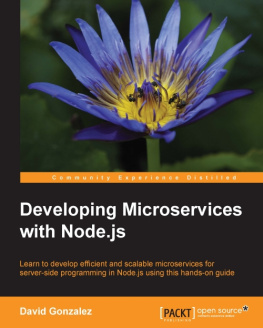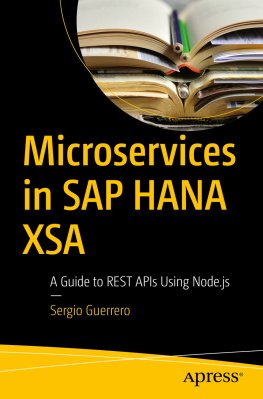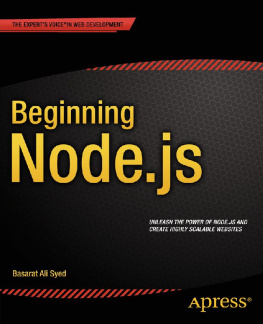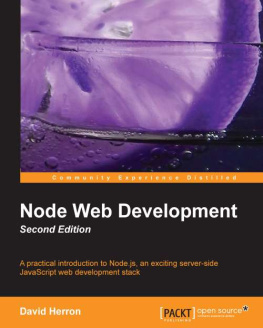David Gonzalez - Developing Microservices with Node.js
Here you can read online David Gonzalez - Developing Microservices with Node.js full text of the book (entire story) in english for free. Download pdf and epub, get meaning, cover and reviews about this ebook. year: 2016, publisher: Packt Publishing, genre: Computer. Description of the work, (preface) as well as reviews are available. Best literature library LitArk.com created for fans of good reading and offers a wide selection of genres:
Romance novel
Science fiction
Adventure
Detective
Science
History
Home and family
Prose
Art
Politics
Computer
Non-fiction
Religion
Business
Children
Humor
Choose a favorite category and find really read worthwhile books. Enjoy immersion in the world of imagination, feel the emotions of the characters or learn something new for yourself, make an fascinating discovery.
- Book:Developing Microservices with Node.js
- Author:
- Publisher:Packt Publishing
- Genre:
- Year:2016
- Rating:4 / 5
- Favourites:Add to favourites
- Your mark:
Developing Microservices with Node.js: summary, description and annotation
We offer to read an annotation, description, summary or preface (depends on what the author of the book "Developing Microservices with Node.js" wrote himself). If you haven't found the necessary information about the book — write in the comments, we will try to find it.
Learn to develop micro, efficient, and scalable services for server-side programming in Node.js using this hands-on guide
About This Book- Real world example explained chapter after chapter with code examples.
- Useful concepts for other languages like Java or PHP
- Easy to follow by people with little to none experience in Node.js
- Node.js Version 0.12.2 and the latest compatible versions of Seneca and PM2
Node.js developer with basic server-side development knowledge - but no knowledge of implementing microservices in Node.js applications. Also useful for developers in other languages like Java or C#.
What You Will Learn- Identify where the microservice oriented architectures can tackle the most common problems in the software used by the big organisations.
- Re-architecture an existing monolithic system into a microservices oriented software.
- Build robust and scalable microservices using Seneca and Node.js.
- Testing of the microservices in insolation in order to create a solid system.
- Deploy and manage microservices using PM2
- Monitoring the health of a microservice (CPU, memory, I/O) and how the degradation of the performance in one microservice could degrade the performance of full system.
Microservices architecture is a style of software architecture. As the name suggests, microservicess refers to small services. For a large implementation, this means breaking the system into really small, independent services. Alternative to monolithic architecture (where the entire system is considered as a single big, interwoven segment), microservices approach is getting more and more popular with large, complex applications that have a very long lifecycle, which require changes at regular intervals. Microservices approach allows this type of changes with ease as only a part of the system undergoes changes and change control is easy.
An example of such large system can be an online store-includes user interface, managing product catalog, processing orders, managing customers account. In a microservices architecture each of these tasks will be divided and into smaller services. Also, these services will be further broken down into independent services-for user interface, there will be separate services for input, output, search bar management, and so on. Similarly, all other tasks can be divided in very small and simple services.
David Gonzalez: author's other books
Who wrote Developing Microservices with Node.js? Find out the surname, the name of the author of the book and a list of all author's works by series.







